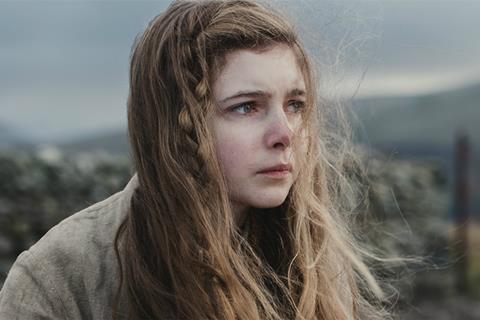A teenage girl faces the hardships of life in 19th Century rural Wales

Dir/scr: William McGregor. UK. 2018. 84mins
A brief opening glimpse of the savage, 19th-century beauty of Wales’ mountainous Snowdonia is soon obscured as a curtain of darkness and suspicion is drawn across the lives of a teenager, her mother and sister. With her father away at war and her mother hollowed out by grief and ill-health, teenager Gwen (Eleanor Worthington-Cox, impressive) begins to comprehend the precarious position of her family as the local slate baron eyes their dank small-holding as the site for his next quarry. The striking lighting (or more accurately the lack of it) and arresting use of horror tropes makes for a period piece which is heavy on brooding atmospherics, but lighter on plot.
McGregor has a particularly keen eye for the macabre, paganistic rituals which linger in the murkiest corners of Victorian Britain
The feature debut of 2012 Screen International Star Of Tomorrow William McGregor, Gwen confirms the director’s talent for evocative use of landscape (he also helmed several episodes of Poldark). But the picture’s grim trajectory – there’s no Lady Macbeth-style feminist kick back at the relentless crushing boots of the patriarchy – mean that the film may struggle to resonate outside of the festival circuit and the arthouse audience at its most austere.
In the role of the beleaguered mother, Elen, Maxine Peake is effective but slightly underused. Peake spends the majority of her scenes looking drawn and desperate and it’s only towards the second half of the picture, when Elen starts to lose her grasp on the threads which keep her subsistence-level scrabble of survival together, that the role allows her to flex her dramatic muscles. The flinty fury she conveys in a scene with the family horse is harrowing, but it serves to underline how curiously absent she is through much of the rest of the film.
But it’s through Gwen’s eyes that this story unfolds; and it’s her journey – a coming of age of sorts – that we follow. Adrift in the hinterland between childhood innocence and the responsibilities of adulthood which grind down her mother, Gwen starts out as a playmate for her little sister and ends the film as the child’s de facto parent. Worthington-Cox is terrific; the mounting uncertainty in her eyes seeds the suspicion of wrongdoing throughout the film.
Not that it actually takes much suggestion – each frame is loaded with omens of ill-fortune: the rotten potato that Gwen unearths; the perpetually moaning wind; the hectoring church sermon which warns of “the dark evil around us”; the way the petticoats hung on hooks on the wall take on a haunted quality in the candlelit dusk; the scorched sheep skulls which herald family tragedy.
McGregor has a particularly keen eye for the macabre, paganistic rituals which linger in the murkiest corners of Victorian Britain. The charred bones of Elen’s dead sheep are crushed up and scattered as a barrier against evil – there’s a mournful melodic quality to the shatter of the skulls which echoes the clink of the slate as it is hacked out of the hillside. And Elen is often caught covertly cutting herself, first to use the blood as rouge, and later to release the guilt that she feels for failing her children.
By the third act, McGregor has fully embraced the horror devices – jump scares and thunder crashes abound – which he flirts with earlier in the picture. But in fact, it is the more subtle suggestions of discord, rather than the overt shock techniques, which most effectively create the film’s lingering sense of unease
Production company: Endor Film
International Sales: Great Point Media info@greatpointmedia.com
Producers: Tom Nash, Hilary Bevan Jones
Production Design: Laura Ellis Cricks
Editing: Mark Towns
Cinematography: Adam Etherington
Music: James Edward Barker
Main cast: Maxine Peake, Eleanor Worthington-Cox, Richard Harrington, Kobna Holdbrook-Smith, Jodie Innes, Mark Lewis Jones
























